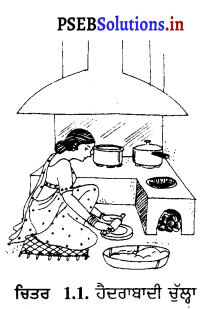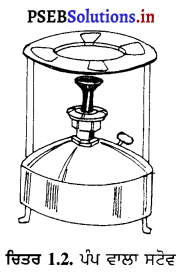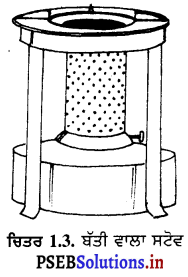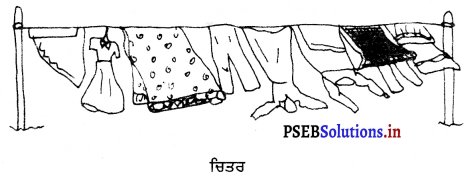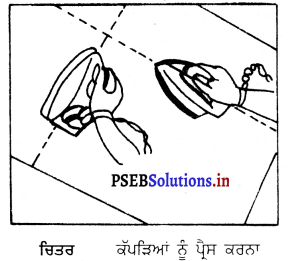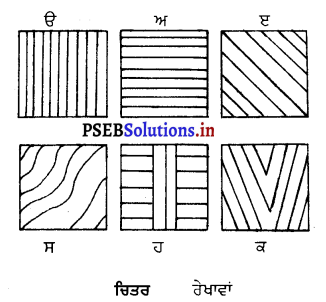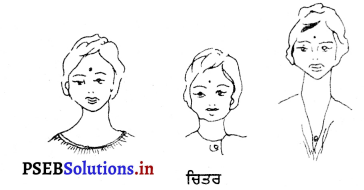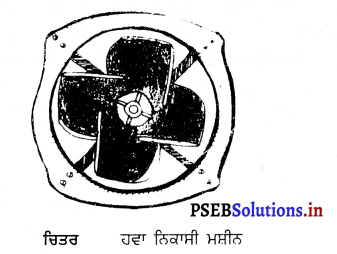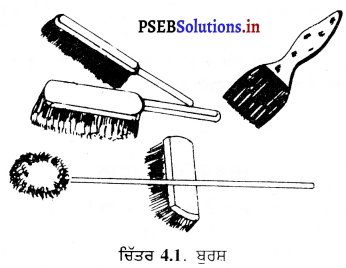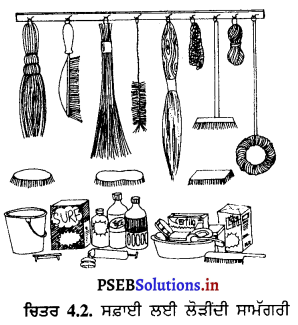Punjab State Board PSEB 6th Class Home Science Book Solutions Chapter 2 ਭੋਜਨ ਦੇ ਕੰਮ, ਤੱਤ ਅਤੇ ਉਹਨਾਂ ਦੇ ਸੋਮੇ Textbook Exercise Questions and Answers.
PSEB Solutions for Class 6 Home Science Chapter 2 ਭੋਜਨ ਦੇ ਕੰਮ, ਤੱਤ ਅਤੇ ਉਹਨਾਂ ਦੇ ਸੋਮੇ
ਅਭਿਆਸ ਦੇ ਪ੍ਰਸ਼ਨ
ਵਸਤੂਨਿਸ਼ਠ ਪ੍ਰਸ਼ਨ
ਪ੍ਰਸ਼ਨ 1.
ਸਰੀਰ ਦੇ ਨਿਰਮਾਣ ਅਤੇ ਵਿਕਾਸ ਕਰਨ ਵਾਲੇ ਤੱਤ ਦਾ ਨਾਂ ਲਿਖੋ ।
ਉੱਤਰ-
ਪ੍ਰੋਟੀਨ ਅਤੇ ਖਣਿਜ ਲੂਣ ।
ਪ੍ਰਸ਼ਨ 2.
ਜੀਵਨ ਰੱਖਿਅਕ ਤੱਤ ਦਾ ਨਾਂ ਲਿਖੋ ।
ਉੱਤਰ-
ਵਿਟਾਮਿਨਜ਼ ।
ਪ੍ਰਸ਼ਨ 3.
ਕਾਰਬੋਜ਼ ਦੇ ਦੋ ਪ੍ਰਮੁੱਖ ਪ੍ਰਾਪਤੀ ਸਰੋਤ ਦੱਸੋ ।
ਉੱਤਰ-
ਅਨਾਜ ਅਤੇ ਗੰਨਾ ।

ਪ੍ਰਸ਼ਨ 4.
ਸਰੀਰ ਵਿਚ ਚਿਕਨਾਈ ਦਾ ਮੁੱਖ ਕਾਰਜ ਲਿਖੋ ।
ਉੱਤਰ-
ਸਰੀਰ ਨੂੰ ਊਰਜਾ ਅਤੇ ਸ਼ਕਤੀ ਪ੍ਰਦਾਨ ਕਰਨਾ ।
ਪ੍ਰਸ਼ਨ 5.
ਕੈਲਸ਼ੀਅਮ ਦਾ ਸਰੀਰ ਲਈ ਮੁੱਖ ਕਾਰਜ ਕੀ ਹੈ ?
ਉੱਤਰ-
ਸਰੀਰ ਵਿਚ ਹੱਡੀਆਂ ਅਤੇ ਦੰਦਾਂ ਦਾ ਨਿਰਮਾਣ ਕਰਨਾ ਅਤੇ ਉਹਨਾਂ ਨੂੰ ਮਜ਼ਬੂਤ ਬਣਾਉਣਾ ।
ਪ੍ਰਸ਼ਨ 6.
ਲੋਹਾ ਪ੍ਰਾਪਤੀ ਦੇ ਦੋ ਮੁੱਖ ਸਾਧਨਾਂ ਦੇ ਨਾਂ ਲਿਖੋ ।
ਉੱਤਰ-
ਕਲੇਜੀ, ਮਾਸ, ਮੱਛੀ, ਆਂਡੇ, ਪੱਤੇਦਾਰ ਸਬਜ਼ੀਆਂ, ਸ਼ਲਗਮ, ਬੈਂਗਣ, ਅਨਾਜ, ਕਣਕ, ਦਾਲਾਂ, ਸੁੱਕੇ ਮੇਵੇ, ਸੇਲਾ ਚੌਲ, ਗੁੜ ਆਦਿ ।
ਪ੍ਰਸ਼ਨ 7.
ਵਿਟਾਮਿਨ ‘ਬੀ ਦਾ ਮੁੱਖ ਕੰਮ ਕੀ ਹੈ ?
ਉੱਤਰ-
ਇਹ ਦਿਲ ਅਤੇ ਦਿਮਾਰੀ ਨੂੰ ਸ਼ਕਤੀ ਦਿੰਦਾ ਹੈ ।
ਪ੍ਰਸ਼ਨ 8.
ਸਰੀਰ ਲਈ ਵਿਟਾਮਿਨ ‘ਸੀਂ ਕਿਉਂ ਜ਼ਰੂਰੀ ਹੈ ?
ਉੱਤਰ-
ਦੰਦਾਂ ਅਤੇ ਮਸੂੜਿਆਂ ਨੂੰ ਸਵਸਥ ਅਤੇ ਮਜ਼ਬੂਤ ਰੱਖਣ ਲਈ, ਜ਼ਖ਼ਮਾਂ ਨੂੰ ਜਲਦੀ ਭਰਨ ਲਈ ਅਤੇ ਸਰੀਰ ਨੂੰ ਛੂਤ ਦੇ ਰੋਗਾਂ ਤੋਂ ਬਚਾਉਣ ਲਈ ।
ਪ੍ਰਸ਼ਨ 9.
ਵਿਟਾਮਿਨ ਏ ਦਾ ਇਕ ਜ਼ਰੂਰੀ ਕੰਮ ਲਿਖੋ ।
ਉੱਤਰ-
ਅੱਖਾਂ ਨੂੰ ਰੋਗੀ ਹੋਣ ਤੋਂ ਬਚਾਉਣਾ ਅਤੇ ਚਮੜੀ ਨੂੰ ਸਵਸਥ ਅਤੇ ਚਿਕਨਾ ਰੱਖਣਾ ।

ਪ੍ਰਸ਼ਨ 10.
ਪਾਣੀ ਦਾ ਮੁੱਖ ਕੰਮ ਲਿਖੋ ।
ਉੱਤਰ-
ਇਹ ਪੋਸ਼ਕ ਤੱਤਾਂ ਅਤੇ ਸਰੀਰਕ ਕਿਰਿਆਵਾਂ ਦੇ ਨਿਯਮਨ ਦਾ ਕਾਰਜ ਕਰਦਾ ਹੈ ।
ਛੋਟੇ ਉੱਤਰਾਂ ਵਾਲੇ ਪ੍ਰਸ਼ਨ
ਪ੍ਰਸ਼ਨ 11.
ਭੋਜਨ ਖਾਣਾ ਕਿਉਂ ਜ਼ਰੂਰੀ ਹੈ ?
ਉੱਤਰ-
ਸਾਨੂੰ ਆਪਣੇ ਸਰੀਰ ਦੇ ਵਾਧੇ ਲਈ, ਰੋਗਾਂ ਤੋਂ ਬਚਣ ਲਈ, ਸਰੀਰ ਨੂੰ ਸਵਸਥ ਰੱਖਣ ਲਈ ਅਤੇ ਸਰੀਰ ਦੇ ਸਾਰੇ ਅੰਗਾਂ ਨੂੰ ਠੀਕ ਢੰਗ ਨਾਲ ਕੰਮ ਕਰਦੇ ਰਹਿਣ ਲਈ ਭੋਜਨ ਦੀ ਲੋੜ ਪੈਂਦੀ ਹੈ । ਸਰੀਰ ਦੀਆਂ ਕਿਰਿਆਵਾਂ ਨੂੰ ਕਰਨ ਲਈ ਸ਼ਕਤੀ ਦੀ ਲੋੜ ਪੈਂਦੀ ਹੈ। ਜੋ ਭੋਜਨ ਤੋਂ ਮਿਲਦੀ ਹੈ ।
ਪ੍ਰਸ਼ਨ 12.
ਭੋਜਨ ਦੇ ਪੌਸ਼ਟਿਕ ਤੱਤ ਕਿਹੜੇ-ਕਿਹੜੇ ਹਨ ?
ਉੱਤਰ-
ਭੋਜਨ ਦੇ ਪੌਸ਼ਟਿਕ ਤੱਤ ਹੇਠ ਲਿਖੇ ਹਨ
- ਪ੍ਰੋਟੀਨ
- ਕਾਰਬੋਹਾਈਡੇਟ
- ਚਿਕਨਾਈ
- ਖਣਿਜ ਲੂਣ
- ਵਿਟਾਮਿਨ
- ਪਾਣੀ ।
ਪ੍ਰਸ਼ਨ 13.
ਸਰੀਰ ਦੇ ਵਾਧੇ ਅਤੇ ਵਿਕਾਸ ਲਈ ਭੋਜਨ ਦੇ ਕਿਹੜੇ ਤੱਤ ਦੀ ਜ਼ਰੂਰਤ ਹੁੰਦੀ ਹੈ ? ਇਸ ਦੇ ਸਰੋਤ ਵੀ ਦੱਸੋ ।
ਉੱਤਰ-
ਸਰੀਰ ਦੇ ਵਾਧੇ ਅਤੇ ਵਿਕਾਸ ਲਈ ਭੋਜਨ ਦੇ ਹੇਠ ਲਿਖੇ ਤੱਤਾਂ ਦੀ ਲੋੜ ਹੁੰਦੀ ਹੈ-
1. ਪ੍ਰੋਟੀਨ – ਇਹ ਕਾਰਬਨ-ਹਾਈਡਰੋਜਨ, ਆਕਸੀਜਨ ਅਤੇ ਨਾਈਟਰੋਜਨ ਦੇ ਮੇਲ ਤੋਂ ਬਣੀ ਹੁੰਦੀ ਹੈ । ਸਿਰਫ਼ ਪ੍ਰੋਟੀਨ ਹੀ ਭੋਜਨ ਦਾ ਇਕ ਅਜਿਹਾ ਭਾਗ ਹੈ ਜਿਸ ਵਿਚ ਨਾਈਟਰੋਜਨ ਹੁੰਦਾ ਹੈ । ਪ੍ਰੋਟੀਨ ਸਾਡੇ ਸਰੀਰ ਵਿਚ ਟੁੱਟੀਆਂ-ਭੱਜੀਆਂ ਕੋਸ਼ਿਕਾਵਾਂ ਦੀ ਮੁਰੰਮਤ ਅਤੇ ਨਵੀਆਂ
ਕੋਸ਼ਿਕਾਵਾਂ ਦਾ ਨਿਰਮਾਣ ਕਰਦੀ ਹੈ । ਇਹ ਸਾਡੇ ਸਰੀਰ ਦੇ ਵਿਕਾਸ ਲਈ ਬਹੁਤ ਜ਼ਰੂਰੀ ਹੈ । ਇਸ ਲਈ ਵਿਕਸਿਤ ਹੋ ਰਹੇ ਬੱਚਿਆਂ ਦੇ ਭੋਜਨ ਵਿਚ ਪ੍ਰੋਟੀਨ ਹੋਣਾ ਚਾਹੀਦਾ ਹੈ । ਇਸ ਦੀ ਕਮੀ ਨਾਲ ਬੱਚਿਆਂ ਦਾ ਕੱਦ ਛੋਟਾ ਹੋ ਜਾਂਦਾ ਹੈ ।
ਸੋਮੇ – ਬਨਸਪਤੀ ਪ੍ਰੋਟੀਨ – ਸੋਇਆਬੀਨ, ਮੂੰਗਫਲੀ, ਰਾਜਮਾਂਹ, ਛਿਲਕੇ ਵਾਲੀਆਂ ਦਾਲਾਂ, ਮਟਰ, ਫਰਾਂਸਬੀਨ, ਕਣਕ ਆਦਿ ।
ਪ੍ਰਾਣੀਜਨ ਪ੍ਰੋਟੀਨ – ਆਂਡਾ, ਮੱਛੀ, ਮੁਰਗਾ, ਦੁੱਧ, ਦਹੀਂ ਅਤੇ ਪਨੀਰ ।
2. ਕਾਰਬੋਹਾਈਡੇਟ – ਇਹ ਕਾਰਬਨ-ਹਾਈਡਰੋਜਨ ਅਤੇ ਆਕਸੀਜਨ ਦੇ ਮੇਲ ਤੋਂ ਬਣਦੇ ਹਨ । ਇਹ ਸਾਡੇ ਸਰੀਰ ਵਿਚ ਜਲ ਕੇ ਗਰਮੀ ਪੈਦਾ ਕਰਦੇ ਹਨ, ਜਿਸ ਨਾਲ ਸਾਨੂੰ ਕੰਮ ਕਰਨ ਦੀ ਸ਼ਕਤੀ ਮਿਲਦੀ ਹੈ । ਦੂਜੇ ਭੋਜਨਾਂ ਦੀ ਤੁਲਨਾ ਵਿਚ ਸਸਤੇ ਹੋਣ ਦੇ ਕਾਰਨ ਗ਼ਰੀਬ ਲੋਕ ਵੀ ਜ਼ਿਆਦਾ ਕਾਰਬੋਹਾਈਡੇਟ ਦਾ ਇਸਤੇਮਾਲ ਕਰਦੇ ਹਨ । ਇਸ ਦੀ ਕਮੀ ਨਾਲ ਸਰੀਰ ਪਤਲਾ ਅਤੇ ਕਮਜ਼ੋਰ ਹੋ ਜਾਂਦਾ ਹੈ ।
ਸੋਮੇ – ਗੁੜ, ਖੰਡ, ਗੰਨੇ ਦਾ ਰਸ, ਸ਼ਹਿਦ, ਖਜੂਰ, ਅੰਗੂਰ, ਕਿਸ਼ਮਿਸ਼, ਕਣਕ, ਚੌਲ, ਆਲੂ, ਸ਼ਕਰਕੰਦੀ ਆਦਿ ।
3. ਚਿਕਨਾਈ – ਕਾਰਬੋਹਾਈਡੇਟ ਦੀ ਤਰ੍ਹਾਂ ਚਿਕਨਾਈ ਵੀ ਕਾਰਬਨ ਹਾਈਡਰੋਜਨ ਅਤੇ ਆਕਸੀਜਨ ਦੇ ਮੇਲ ਨਾਲ ਬਣਦੀ ਹੈ । ਇਹ ਵੀ ਸਾਡੇ ਸਰੀਰ ਨੂੰ ਗਰਮੀ ਅਤੇ ਸ਼ਕਤੀ ਦਿੰਦੀ ਹੈ । ਚਿਕਨਾਈ ਸਰੀਰ ਦੇ ਅੰਗਾਂ ਦੀ ਰੱਖਿਆ ਕਰਦੀ ਹੈ ਪਰੰਤੂ ਜੇ ਲੋੜ ਤੋਂ ਵੱਧ ਮਾਤਰਾ ਵਿਚ ਖਾਧੀ ਜਾਵੇ ਤਾਂ ਸਰੀਰ ਉੱਤੇ ਚਰਬੀ ਦੀ ਮੋਟੀ ਤਹਿ ਜੰਮ ਜਾਂਦੀ ਹੈ ਜਿਸ ਨਾਲ ਸਰੀਰ ਮੋਟਾ ਹੋ ਜਾਂਦਾ ਹੈ ।
ਸੋਮੇ – ਪਾਣੀਜਨ ਚਿਕਨਾਈ-ਮੱਖਣ, ਦੇਸੀ ਘਿਓ, ਦੁੱਧ, ਮੱਛੀ ਦਾ ਤੇਲ, ਜਾਨਵਰਾਂ ਦੀ ਚਰਬੀ ਅਤੇ ਆਂਡੇ ਦੀ ਜ਼ਰਦੀ ।
ਬਨਸਪਤੀ ਚਿਕਨਾਈ – ਤੇਲ ਅਤੇ ਤੇਲਾਂ ਦੇ ਬੀਜ, ਬਨਸਪਤੀ ਘਿਓ ਅਤੇ ਖ਼ੁਸ਼ਕ ਮੇਵੇ ।
4. ਖਣਿਜ ਲੂਣ – ਪ੍ਰੋਟੀਨ, ਕਾਰਬੋਜ਼, ਚਿਕਨਾਈ, ਵਿਟਾਮਿਨ ਅਤੇ ਪਾਣੀ ਤੋਂ ਇਲਾਵਾ ਸਰੀਰ ਦੇ ਲਈ ਖਣਿਜ ਲੂਣ ਵੀ ਲੋੜੀਂਦੇ ਹਨ । ਇਹ ਸਰੀਰ ਦੀ ਰੱਖਿਆ ਕਰਨ ਵਾਲੇ ਭੋਜਨ ਪਦਾਰਥਾਂ ਵਿਚ ਆਉਂਦੇ ਹਨ । ਇਹਨਾਂ ਦੀ ਘਾਟ ਨਾਲ ਸਰੀਰ ਵਿਚ ਕਈ ਪ੍ਰਕਾਰ ਦੀਆਂ ਕਮੀਆਂ ਆ ਜਾਂਦੀਆਂ ਹਨ ।
ਸੋਮੇ – ਹਰੀਆਂ ਪੱਤੇਦਾਰ ਸਬਜ਼ੀਆਂ, ਤਾਜ਼ੇ ਫਲਾਂ, ਦੁੱਧ, ਆਂਡੇ, ਖਮੀਰ, ਮੂੰਗਫਲੀ, ਛਿਲਕੇ ਵਾਲੀਆਂ ਦਾਲਾਂ ਅਤੇ ਅਨਾਜ ।
5. ਵਿਟਾਮਿਨ – ਜੇਕਰ ਸਾਡੇ ਭੋਜਨ ਵਿਚ ਬਾਕੀ ਸਾਰੇ ਤੱਤ ਤਾਂ ਸ਼ਾਮਲ ਹੋਣ ਪਰ ਵਿਟਾਮਿਨ ਦੀ ਕਮੀ ਹੋਵੇ ਤਾਂ ਸਰੀਰ ਠੀਕ ਤਰ੍ਹਾਂ ਵਿਕਾਸ ਨਹੀਂ ਕਰਦਾ ਹੈ ।
ਸੋਮੇ-ਦੁੱਧ, ਦਹੀਂ, ਗਾਜਰ, ਪਪੀਤਾ, ਅਨਾਜ, ਦਾਲਾਂ, ਆਂਵਲਾ, ਕਲੇਜੀ ਆਦਿ ।
6. ਪਾਣੀ – ਪਾਣੀ ਇਕ ਰਸਾਇਣਿਕ ਸੰਯੋਗ ਹੈ । ਇਸ ਵਿਚ ਦੋ ਮਾਤਰਾ ਹਾਈਡਰੋਜਨ ਅਤੇ ਇਕ ਮਾਤਰਾ ਆਕਸੀਜਨ ਦੀ ਹੁੰਦੀ ਹੈ । ਸਾਡੇ ਸਰੀਰ ਵਿਚ 70-75 ਪ੍ਰਤੀਸ਼ਤ ਪਾਣੀ ਹੁੰਦਾ ਹੈ ।
ਸੋਮੇ – ਦੁੱਧ, ਚਾਹ, ਲੱਸੀ, ਨਿੰਬੂ, ਸੰਤਰਾ, ਮਾਲਟਾ, ਤਰਬੂਜ਼, ਨਾਰੀਅਲ, ਹਰੀਆਂ ਸਬਜ਼ੀਆਂ ।

ਪ੍ਰਸ਼ਨ 14.
ਪਾਣੀ ਦੇ ਕੀ ਲਾਭ ਹਨ ?
ਉੱਤਰ-
ਪਾਣੀ ਤੋਂ ਸਾਨੂੰ ਹੇਠ ਲਿਖੇ ਲਾਭ ਹਨ :
- ਪਾਣੀ ਸਾਡੇ ਭੋਜਨ ਨੂੰ ਤਰਲ ਬਣਾਉਂਦਾ ਹੈ ਜਿਸ ਨਾਲ ਇਹ ਇਕ ਥਾਂ ਤੋਂ ਦੂਜੀ ਥਾਂ ਤੇ ਆਸਾਨੀ ਨਾਲ ਜਾ ਸਕਦਾ ਹੈ ਅਤੇ ਭੋਜਨ ਸੌਖ ਨਾਲ ਪਚ ਜਾਂਦਾ ਹੈ ।
- ਪਾਣੀ ਸਾਡੇ ਸਰੀਰ ਵਿਚ ਵੱਖ-ਵੱਖ ਕਿਰਿਆਵਾਂ ਦੇ ਸਿੱਟੇ ਵਜੋਂ ਬਣੇ ਜ਼ਹਿਰੀਲੇ ਪਦਾਰਥਾਂ ਨੂੰ ਸਰੀਰ ਵਿਚੋਂ ਬਾਹਰ ਕੱਢਣ ਵਿਚ ਸਹਾਇਤਾ ਦਿੰਦਾ ਹੈ ।
- ਪਾਣੀ ਸਰੀਰ ਦਾ ਤਾਪਮਾਨ ਠੀਕ ਰੱਖਣ ਅਤੇ ਖੂਨ ਦੇ ਦੌਰੇ ਨੂੰ ਠੀਕ ਰੱਖਣ ਲਈ ਵੀ ਜ਼ਰੂਰੀ ਹੈ ।
ਪ੍ਰਸ਼ਨ 15.
ਭੋਜਨ ਦੇ ਕਿਹੜੇ ਪੌਸ਼ਟਿਕ ਤੱਤ ਵਿਚ ਨਾਈਟਰੋਜਨ ਹੁੰਦੀ ਹੈ ਅਤੇ ਸਰੀਰ ਵਿਚ ਇਸ ਦੇ ਕੀ ਕੰਮ ਹਨ ?
ਉੱਤਰ-
ਭੋਜਨ ਦੇ ਪ੍ਰੋਟੀਨ ਪੌਸ਼ਟਿਕ ਤੱਤ ਵਿਚ ਨਾਈਟਰੋਜਨ ਹੁੰਦੀ ਹੈ । ਪ੍ਰੋਟੀਨ ਸਾਡੇ ਸਰੀਰ ਵਿਚ ਟੁੱਟੀਆਂ-ਭੱਜੀਆਂ ਕੋਸ਼ਿਕਾਵਾਂ ਦੀ ਮੁਰੰਮਤ ਅਤੇ ਨਵੀਆਂ ਕੋਸ਼ਿਕਾਵਾਂ ਦਾ ਨਿਰਮਾਣ ਕਰਦਾ ਹੈ ।
ਪ੍ਰਸ਼ਨ 16.
ਦਾਲਾਂ ਨੂੰ ਪੁੰਗਰਾ ਕੇ ਖਾਣ ਦਾ ਕੀ ਫਾਇਦਾ ਹੈ ?
ਉੱਤਰ-
ਆਮ ਕਰਕੇ ਦਾਲਾਂ ਵਿੱਚ ਵਿਟਾਮਿਨ ‘ਸੀ’ ਨਹੀਂ ਹੁੰਦਾ ਹੈ ਅਤੇ ਇਨ੍ਹਾਂ ਦਾ ਪੌਸ਼ਟਿਕ ਮਾਨ ਵਧਾਉਣ ਲਈ ਇਨ੍ਹਾਂ ਨੂੰ ਪੁੰਗਾਰਿਆ ਜਾਂਦਾ ਹੈ । ਪੁੰਗਰੀਆਂ ਦਾਲਾਂ ਵਿੱਚ ਵਿਟਾਮਿਨ ਸੀ ਦੀ ਮਾਤਰਾ ਤੇ ਹੋਰ ਵਿਟਾਮਿਨਾਂ ਦੀ ਮਾਤਰਾ ਵਧ ਜਾਂਦੀ ਹੈ ।
ਪ੍ਰਸ਼ਨ 17.
ਮਹੱਤਵਪੂਰਨ ਖਣਿਜ ਲੂਣ ਕਿਹੜੇ ਹਨ ਅਤੇ ਸਰੀਰ ਵਿਚ ਉਨ੍ਹਾਂ ਦਾ ਕੀ ਕੰਮ ਹੈ ?
ਉੱਤਰ-
ਸਾਡੇ ਸਰੀਰ ਲਈ ਮਹੱਤਵਪੂਰਨ ਖਣਿਜ ਲੂਣ ਹੇਠ ਲਿਖੇ ਹਨ :-
(i) ਕੈਲਸ਼ੀਅਮ
(ii) ਫਾਸਫੋਰਸ
(iii) ਲੋਹਾ
(iv) ਆਇਓਡੀਨ
(v) ਮੈਗਨੀਸ਼ੀਅਮ ।
ਮਹੱਤਵਪੂਰਨ ਖਣਿਜ ਲੂਣਾਂ ਦੇ ਕੰਮ
(i) ਕੈਲਸ਼ੀਅਮ ਦੇ ਕੰਮ :-
- ਹੱਡੀਆਂ ਅਤੇ ਦੰਦਾਂ ਦਾ ਨਿਰਮਾਣ ਕਰਦਾ ਹੈ ।
- ਹੱਡੀਆਂ ਅਤੇ ਦੰਦਾਂ ਨੂੰ ਮਜ਼ਬੂਤ ਬਣਾਈ ਰੱਖਦਾ ਹੈ ।
- ਮਾਸਪੇਸ਼ੀਆਂ ਦੀ ਕਿਰਿਆਸ਼ੀਲਤਾ ਅਤੇ ਦਿਲ ਦੀ ਗਤੀ ਨੂੰ ਕੰਟਰੋਲ ਕਰਦਾ ਹੈ ।
- ਇਹ ਨਾੜੀਆਂ ਨੂੰ ਸਵਸਥ ਰੱਖਦਾ ਹੈ ।
- ਇਹ ਖੂਨ ਦੇ ਜੰਮਣ ਵਿਚ ਸਹਾਇਤਾ ਕਰਦਾ ਹੈ ।
(ii) ਫਾਸਫੋਰਸ ਦੇ ਕੰਮ :-
- ਕੈਲਸ਼ੀਅਮ ਦੀ ਤਰ੍ਹਾਂ ਹੀ ਇਹ ਸਾਡੀਆਂ ਹੱਡੀਆਂ ਨੂੰ ਮਜ਼ਬੂਤ ਬਣਾਉਣ ਵਿਚ ਮਦਦ ਕਰਦਾ ਹੈ ।
- ਇਹ ਨਾੜੀ ਪ੍ਰਣਾਲੀ ਨੂੰ ਪੂਰਨ ਰੂਪ ਵਿਚ ਸਵਸਥ ਬਣਾਉਂਦਾ ਹੈ ।
- ਸਾਡੇ ਸਰੀਰ ਵਿਚ ਸਥਿਤ ਦ੍ਰ ਪਦਾਰਥਾਂ ਦੀ ਮਾਤਰਾ ਨੂੰ ਸਥਿਰ ਰੱਖਣ ਵਿਚ ਮਦਦ ਦਿੰਦਾ ਹੈ ।
- ਇਹ ਸਰੀਰ ਦੇ ਉਚਿਤ ਵਿਕਾਸ ਵਿਚ ਸਹਾਇਕ ਹੁੰਦਾ ਹੈ ।
- ਇਹ ਕੈਲਸ਼ੀਅਮ ਦੇ ਅਵਸ਼ੋਸ਼ਣ ਵਿਚ ਸਹਾਇਤਾ ਕਰਦਾ ਹੈ ।
(iii) ਲੋਹੇ ਦੇ ਕੰਮ :-
- ਇਹ ਪ੍ਰੋਟੀਨ ਨਾਲ ਸੰਯੋਗ ਕਰਕੇ ਲਾਲ ਰਕਤਾਣੂਆਂ ਵਿਚ ਹੀਮੋਗਲੋਬਿਨ ਨੂੰ ਬਣਾਉਂਦਾ ਹੈ ।
- ਹੀਮੋਗਲੋਬਿਨ ਦੀ ਸਹਾਇਤਾ ਨਾਲ ਆਕਸੀਜਨ ਦੀ ਪੂਰਤੀ ਕਰਦਾ ਹੈ ।
- ਹੀਮੋਗਲੋਬਿਨ ਸਰੀਰ ਵਿਚ ਬਣਨ ਵਾਲੀ ਗੰਦੀ ਹਵਾ (ਕਾਰਬਨ-ਡਾਈਆਕਸਾਈਡ) ਨੂੰ ਸ਼ੁੱਧ ਕਰਨ ਲਈ ਫੇਫੜਿਆਂ ਵਿਚ ਲੈ ਜਾਂਦਾ ਹੈ ।
(iv) ਆਇਓਡੀਨ ਦੇ ਕੰਮ :-
- ਇਹ ਥਾਈਰਾਈਡ ਗ੍ਰੰਥੀ ਦੀ ਕਿਰਿਆਸ਼ੀਲਤਾ ਲਈ ਜ਼ਰੂਰੀ ਹੈ ।
- ਇਹ ਬਿਰਧ ਅਵਸਥਾ ਵਿਚ ਮਾਨਸਿਕ ਅਤੇ ਸਰੀਰਕ ਵਿਕਾਸ ਦੇ ਲਈ ਜ਼ਰੂਰੀ ਹੈ ।
- ਇਹ ਸਰੀਰ ਵਿਚ ਕੈਲਸ਼ੀਅਮ ਅਤੇ ਚਿਕਨਾਈ ਦਾ ਉਚਿਤ ਪ੍ਰਯੋਗ ਕਰਨ ਵਿਚ ਸਹਾਇਤਾ ਦਿੰਦਾ ਹੈ ।
- ਆਇਓਡੀਨ ਦੀ ਕਮੀ ਨਾਲ ਵਾਲਾਂ ਦਾ ਵਾਧਾ ਨਹੀਂ ਹੁੰਦਾ ।
(v) ਮੈਗਨੀਸ਼ੀਅਮ ਦੇ ਕੰਮ :-
- ਇਹ ਹੱਡੀ, ਦੰਦ, ਕੋਸ਼ਿਕਾ ਅਤੇ ਖੂਨ ਵਿਚ ਮਿਲਦਾ ਹੈ ।
- ਇਕ ਕੈਲਸ਼ੀਅਮ ਅਤੇ ਫਾਸਫੋਰਸ ਦੇ ਉਪਾਚਨ ਵਿਚ ਸਹਾਇਕ ਹੈ ।
- ਇਸ ਦੀ ਕਮੀ ਨਾਲ ਨਾੜੀਆਂ ਸੰਬੰਧੀ ਰੋਗ ਅਤੇ ਅਕੜਾਨ ਹੋਣ ਲੱਗਦੀ ਹੈ ।
- ਇਸ ਦੀ ਕਮੀ ਨਾਲ ਸਿਰ ਦਰਦ ਅਤੇ ਜੋੜਾਂ ਵਿਚ ਦਰਦ ਦਾ ਡਰ ਬਣਿਆ ਰਹਿੰਦਾ ਹੈ ।

ਪ੍ਰਸ਼ਨ 18.
ਪਾਣੀ ਵਿਚ ਘੁਲਣ ਵਾਲੇ ਵਿਟਾਮਿਨ ਕਿਹੜੇ ਹਨ ? ਇਹਨਾਂ ਦੀ ਕਮੀ ਨਾਲ ਸਰੀਰ ਨੂੰ ਕਿਹੜੀਆਂ ਬਿਮਾਰੀਆਂ ਹੋ ਜਾਂਦੀਆਂ ਹਨ ?
ਉੱਤਰ-
ਪਾਣੀ ਵਿਚ ਘੁਲਣਸ਼ੀਲ ਵਿਟਾਮਿਨ ਹੇਠ ਲਿਖੇ ਹਨ :
(i) ਵਿਟਾਮਿਨ ‘ਬੀ’
(ii) ਵਿਟਾਮਿਨ ‘ਸੀ’ ।
(i) ਵਿਟਾਮਿਨ ‘ਬੀ ਦੀ ਕਮੀ ਨਾਲ ਸਰੀਰ ਵਿਚ ਹੋਣ ਵਾਲੀਆਂ ਬਿਮਾਰੀਆਂ :-
- ਬੇਰੀ-ਬੇਰੀ ਨਾਮਕ ਰੋਗ ਹੋ ਜਾਂਦਾ ਹੈ ।
- ਭੁੱਖ ਘੱਟ ਲਗਦੀ ਹੈ ਅਤੇ ਕਬਜ਼ ਹੋ ਜਾਂਦੀ ਹੈ ।
- ਜੀਅ ਮਿਚਲਾਉਂਦਾ ਹੈ ।
- ਸੁਭਾਅ ਚਿੜਚਿੜਾ ਹੋ ਜਾਂਦਾ ਹੈ ।
- ਸਾਹ ਫੁੱਲਣ ਲੱਗਦਾ ਹੈ ।
- ਮਾਸ ਪੇਸ਼ੀਆਂ ਸਖ਼ਤ ਹੋ ਜਾਂਦੀਆਂ ਹਨ ।
(ii) ਵਿਟਾਮਿਨ ‘ਸੀ’ ਦੀ ਕਮੀ ਨਾਲ ਸਰੀਰ ਵਿਚ ਹੋਣ ਵਾਲੀਆਂ ਬਿਮਾਰੀਆਂ-
- ਸਕਰਵੀ ਨਾਮਕ ਰੋਗ ਹੋ ਜਾਂਦਾ ਹੈ ।
- ਮਸੂੜੇ, ਦੰਦ ਅਤੇ ਹੱਡੀਆਂ ਕਮਜ਼ੋਰ ਹੋ ਜਾਂਦੀਆਂ ਹਨ ।
- ਮਸੂੜਿਆਂ ਵਿਚ ਖੂਨ ਆਉਣ ਲੱਗਦਾ ਹੈ ।
- ਲੱਤਾਂ ਵਿਚ ਦਰਦ ਰਹਿੰਦਾ ਹੈ ।
- ਖੂਨ ਦੀ ਕਮੀ ਹੋ ਜਾਂਦੀ ਹੈ ।
- ਥਕਾਵਟ ਹੋਣ ਲੱਗਦੀ ਹੈ ।
ਪ੍ਰਸ਼ਨ 19.
ਵਿਟਾਮਿਨ ‘ਏ’ ਦੀ ਕਮੀ ਨਾਲ ਨੁਕਸਾਨ ਅਤੇ ਉਸਦੇ ਸੋਮੇ ਲਿਖੋ ।
ਉੱਤਰ-
ਵਿਟਾਮਿਨ ‘ਏ’ ਦੇ ਸੋਮੇ-ਦੁੱਧ, ਦਹੀ, ਆਂਡੇ ਦਾ ਪੀਲਾ ਭਾਗ, ਮੱਛੀ ਦੇ ਤੇਲ, ਮੱਛੀ, ਘਿਓ ਅਤੇ ਮੱਖਣ (ਪਸ਼ੂ ਜਗਤ ਤੋਂ ਪ੍ਰਾਪਤ ਵਿਚ ਵਿਟਾਮਿਨ ‘ਏ’ ਜ਼ਿਆਦਾ ਪਾਇਆ ਜਾਂਦਾ ਹੈ । ਬਨਸਪਤੀਆਂ ਵਿਚ ਹਰੀਆਂ ਪੱਤੇਦਾਰ ਸਬਜ਼ੀਆਂ, ਟਮਾਟਰ, ਪੱਕਿਆ ਹੋਇਆ ਪਪੀਤਾ, ਅੰਬ, ਕੱਦੂ ਸੰਤਰਾ, ਰਸਭਰੀ ਆਦਿ ਵਿਟਾਮਿਨ ‘ਏ’ ਦੀ ਪ੍ਰਾਪਤੀ ਦੇ ਸੋਮੇ ਹਨ ।
ਵਿਟਾਮਿਨ ‘ਏ’ ਦੀ ਕਮੀ ਨਾਲ ਹਾਨੀਆਂ :-
ਸਰੀਰ ਵਿਚ ਵਿਟਾਮਿਨ ‘ਏ’ ਦੀ ਕਮੀ ਨਾਲ ਹੇਠ ਲਿਖੀਆਂ ਹਾਨੀਆਂ ਹੁੰਦੀਆਂ ਹਨ :-
- ਅੱਖਾਂ ਵਿਚ ਅੰਧਰਾਤਾ ਜਾਂ ਰਤੌਂਧੀ ਰੋਗ ਹੋ ਜਾਂਦਾ ਹੈ ।
- ਸਰੀਰ ਦਾ ਵਾਧਾ ਰੁਕ ਜਾਂਦਾ ਹੈ ।
- ਸਰੀਰ ਦੇ ਪੂਰਨ ਵਿਕਾਸ ਵਿਚ ਰੁਕਾਵਟ ਆਉਂਦੀ ਹੈ ।
- ਚਮੜੀ ਖੁਸ਼ਕ ਹੋ ਜਾਂਦੀ ਹੈ ।
- ਦੰਦਾਂ ਦਾ ਰੰਗ ਪੀਲਾ ਪੈ ਜਾਂਦਾ ਹੈ ।
- ਸਾਹ ਲੈਣ ਵਿਚ ਕਠਿਨਾਈ ਹੁੰਦੀ ਹੈ; ਸਿੱਟੇ ਵਜੋਂ ਸਾਹ ਸੰਬੰਧੀ ਛੂਤ ਦੇ ਰੋਗ ਜਿਵੇਂ ਤਪਦਿਕ, ਨਮੋਨੀਆ, ਇਨਫਲੂਏਂਜਾ ਆਦਿ ਹੋਣ ਦੀ ਸੰਭਾਵਨਾ ਹੋ ਜਾਂਦੀ ਹੈ।
- ਪੇਸ਼ਾਬ ਦੀਆਂ ਨਲੀਆਂ ਵਿਚ ਪੱਥਰੀ ਹੋ ਜਾਂਦੀ ਹੈ ।
ਪ੍ਰਸ਼ਨ 20.
ਖੂਨ ਦਾ ਰੰਗ ਲਾਲ ਕਿਉਂ ਹੁੰਦਾ ਹੈ ? ਭੋਜਨ ਵਿਚ ਜੇਕਰ ਲੋਹੇ ਦੀ ਕਮੀ ਹੋ ਜਾਵੇ ਤਾਂ ਸਾਨੂੰ ਕਿਹੜਾ ਰੋਗ ਹੋ ਜਾਂਦਾ ਹੈ ?
ਉੱਤਰ-
ਖੂਨ ਦਾ ਰੰਗ ਲੋਹੇ ਦੇ ਕਾਰਨ ਲਾਲ ਹੁੰਦਾ ਹੈ ।
ਲੋਹੇ ਦੀ ਕਮੀ ਨਾਲ-
- ਰਕਤਹੀਨਤਾ ਜਾਂ ਅਨੀਮੀਆ ਰੋਗ ਹੋ ਜਾਂਦਾ ਹੈ ।
- ਖੂਨ ਵਿਚ ਹੀਮੋਗਲੋਬਿਨ ਦੀ ਮਾਤਰਾ ਘੱਟ ਹੋ ਜਾਣ ਨਾਲ ਨਹੁੰ, ਚਮੜੀ, ਜੀਭ ਅਤੇ ਅੱਖਾਂ ਪੀਲੀਆਂ ਨਜ਼ਰ ਆਉਂਦੀਆਂ ਹਨ ।
- ਭੁੱਖ ਘੱਟ ਲਗਦੀ ਹੈ ।
- ਬੱਚਿਆਂ ਦੇ ਵਿਕਾਸ ਵਿਚ ਰੁਕਾਵਟ ਆਉਂਦੀ ਹੈ ।
- ਜਲਦੀ ਥਕਾਵਟ ਆ ਜਾਂਦੀ ਹੈ ।
- ਰੋਗਾਂ ਨਾਲ ਲੜਨ ਦੀ ਸ਼ਕਤੀ ਘੱਟ ਹੋ ਜਾਂਦੀ ਹੈ ।
PSEB 6th Class Physical Education Guide ਭੋਜਨ ਦੇ ਕੰਮ, ਤੱਤ ਅਤੇ ਉਹਨਾਂ ਦੇ ਸੋਮੇ Important Questions and Answers
ਹੋਰ ਮਹੱਤਵਪੂਰਨ ਪ੍ਰਸ਼ਨ
ਬਹੁਤ ਛੋਟੇ ਉੱਤਰਾਂ ਵਾਲੇ ਪ੍ਰਸ਼ਨ
ਪ੍ਰਸ਼ਨ 1.
ਭੋਜਨ ਦੇ ਤੱਤ ਸਰੀਰ ਲਈ ਕਿਉਂ ਜ਼ਰੂਰੀ ਹੁੰਦੇ ਹਨ ?
ਉੱਤਰ-
ਸਰੀਰ ਨੂੰ ਕਿਰਿਆਸ਼ੀਲ ਰੱਖਣ ਅਤੇ ਸਰੀਰਕ ਵਿਕਾਸ ਲਈ ।

ਪ੍ਰਸ਼ਨ 2.
ਊਰਜਾ ਪ੍ਰਦਾਨ ਕਰਨ ਵਾਲੇ ਤੱਤ ਕਿਹੜੇ-ਕਿਹੜੇ ਹੁੰਦੇ ਹਨ ?
ਉੱਤਰ-
ਕਾਰਬੋਹਾਈਡਰੇਟ ਅਤੇ ਚਿਕਨਾਈ ।
ਪ੍ਰਸ਼ਨ 3.
ਕਾਰਬੋਜ਼ ਕਿਸ-ਕਿਸ ਤੱਤ ਤੋਂ ਮਿਲ ਕੇ ਬਣਦੇ ਹਨ ?
ਉੱਤਰ-
ਕਾਰਬਨ, ਹਾਈਡਰੋਜਨ ਅਤੇ ਆਕਸੀਜਨ ।
ਪ੍ਰਸ਼ਨ 4.
ਕਾਰਬੋਹਾਈਡਰੇਟ ਦਾ ਮੁੱਖ ਕਾਰਜ ਕੀ ਹੈ ?
ਉੱਤਰ-
ਸਰੀਰ ਦੀ ਕਿਰਿਆਸ਼ੀਲਤਾ ਲਈ ਉਰਜਾ ਪ੍ਰਦਾਨ ਕਰਨਾ |
ਪ੍ਰਸ਼ਨ 5.
ਪ੍ਰੋਟੀਨ ਕਿਸ-ਕਿਸ ਤੱਤ ਤੋਂ ਮਿਲ ਕੇ ਬਣੇ ਹੁੰਦੇ ਹਨ ?
ਉੱਤਰ-
ਕਾਰਬਨ, ਹਾਈਡਰੋਜਨ, ਆਕਸੀਜਨ, ਨਾਈਟਰੋਜਨ, ਫਾਸਫੋਰਸ ਅਤੇ ਗੰਧਕ ।
ਪ੍ਰਸ਼ਨ 6.
ਪ੍ਰੋਟੀਨ ਦੇ ਦੋ ਪ੍ਰਮੁੱਖ ਪ੍ਰਾਪਤੀ ਸਰੋਤ ਦੱਸੋ ।
ਉੱਤਰ-
ਆਂਡੇ ਅਤੇ ਦਾਲਾਂ ।
ਪ੍ਰਸ਼ਨ 7.
ਪੂਰਨ ਪ੍ਰੋਟੀਨ ਕਿਸ ਨੂੰ ਕਹਿੰਦੇ ਹਨ ?
ਉੱਤਰ-
ਜੋ ਪ੍ਰੋਟੀਨ ਪਸ਼ੂਆਂ ਤੋਂ ਪ੍ਰਾਪਤ ਹੁੰਦੇ ਹਨ ਉਸ ਨੂੰ ਪੂਰਨ ਪ੍ਰੋਟੀਨ ਕਹਿੰਦੇ ਹਨ ।

ਪ੍ਰਸ਼ਨ 8.
ਕਿਹੜੀਆਂ-ਕਿਹੜੀਆਂ ਬਨਸਪਤੀਆਂ ਵਿਚ ਪ੍ਰੋਟੀਨ ਜ਼ਿਆਦਾ ਮਿਲਦਾ ਹੈ ?
ਉੱਤਰ-
ਦਾਲਾਂ, ਅਨਾਜ, ਸੋਇਆਬੀਨ, ਅਖਰੋਟ, ਮੂੰਗਫਲੀ, ਬਦਾਮ, ਸੇਮ ਦੇ ਬੀਜ, ਮਟਰ ਆਦਿ ਵਿਚ ।
ਪ੍ਰਸ਼ਨ 9.
ਜੰਤੂਆਂ ਤੋਂ ਪ੍ਰਾਪਤ ਕਿਹੜੇ-ਕਿਹੜੇ ਪਦਾਰਥਾਂ ਵਿਚ ਪ੍ਰੋਟੀਨ ਜ਼ਿਆਦਾ ਮਾਤਰਾ ਵਿਚ ਹੁੰਦੀ ਹੈ ?
ਉੱਤਰ-
ਦੁੱਧ, ਦਹੀਂ, ਮੱਖਣ, ਪਨੀਰ, ਆਂਡੇ, ਮਾਸ, ਮੱਛੀ ।
ਪ੍ਰਸ਼ਨ 10.
ਕਾਰਬੋਹਾਈਡੇਟ ਕਿੰਨੇ ਰੁਪਾਂ ਵਿਚ ਮਿਲਦੇ ਹਨ ?
ਉੱਤਰ-
ਤਿੰਨ ਰੂਪਾਂ ਵਿਚ-ਸਟਾਰਚ, ਸ਼ੱਕਰ ਅਤੇ ਖੰਡ ਦੇ ਰੇਸ਼ੇ ।
ਪ੍ਰਸ਼ਨ 11.
ਕਿਹੜੇ-ਕਿਹੜੇ ਸਟਾਰਚ ਵਾਲੇ ਪਦਾਰਥਾਂ ਵਿਚ ਕਾਰਬੋਹਾਈਡੇਟ ਜ਼ਿਆਦਾ ਮਿਲਦਾ ਹੈ ?
ਉੱਤਰ-
ਚੌਲ, ਕਣਕ, ਸ਼ਕਰਕੰਦੀ, ਮੱਕੀ, ਸਾਬੂਦਾਨਾ, ਜੌ, ਅਖਰੋਟ, ਆਲੂ ਆਦਿ ।
ਪ੍ਰਸ਼ਨ 12.
ਕਿਹੜੇ-ਕਿਹੜੇ ਸ਼ੱਕਰ ਵਾਲੇ ਪਦਾਰਥਾਂ ਵਿਚ ਕਾਰਬੋਹਾਈਕ੍ਰੇਟ ਜ਼ਿਆਦਾ ਮਿਲਦਾ ਹੈ ?
ਉੱਤਰ-
ਸ਼ਹਿਦ, ਖੰਡ, ਗੁੜ, ਸੀਰਾ, ਚੁਕੰਦਰ, ਅੰਗੂਰ ਅਤੇ ਹੋਰ ਮਿੱਠੇ ਫਲ ।

ਪ੍ਰਸ਼ਨ 13.
ਚਿਕਨਾਈ ਦੇ ਦੋ ਮੁੱਖ ਸਰੋਤ ਦੱਸੋ ।
ਉੱਤਰ-
ਤੇਲ ਵਾਲੇ ਬੀਜ ਅਤੇ ਦੁੱਧ ।
ਪ੍ਰਸ਼ਨ 14.
ਚਿਕਨਾਈ ਕਿੰਨੇ ਪ੍ਰਕਾਰ ਦੀ ਹੁੰਦੀ ਹੈ ?
ਉੱਤਰ-
ਦੋ ਪ੍ਰਕਾਰ :-
- ਪ੍ਰਾਣੀਜਨ ਚਿਕਨਾਈ ਅਤੇ
- ਬਨਸਪਤੀ ਚਿਕਨਾਈ ।
ਪ੍ਰਸ਼ਨ 15.
ਜੰਤੂਆਂ ਤੋਂ ਪ੍ਰਾਪਤ ਹੋਣ ਵਾਲੇ ਚਿਕਨਾਈ ਪਦਾਰਥ ਕਿਹੜੇ-ਕਿਹੜੇ ਹਨ ?
ਉੱਤਰ-
ਓ, ਦੁੱਧ, ਮੱਖਣ, ਗ਼ਮ, ਦਹੀਂ, ਪਨੀਰ, ਜਾਨਵਰਾਂ ਦੀ ਚਰਬੀ, ਮੱਛੀ, ਆਂਡੇ ਦੀ ਸਫੈਦੀ ।
ਪ੍ਰਸ਼ਨ 16.
ਬਨਸਪਤੀ ਤੋਂ ਪ੍ਰਾਪਤ ਹੋਣ ਵਾਲੇ ਚਿਕਨਾਈ ਪਦਾਰਥ ਕਿਹੜੇ-ਕਿਹੜੇ ਹਨ ?
ਉੱਤਰ-
ਮੂੰਗਫਲੀ, ਸਰੋਂ, ਤਿਲ, ਨਾਰੀਅਲ, ਬਦਾਮ, ਅਖਰੋਟ, ਚਿਲਗੋਜਾ ਆਦਿ ।
ਪ੍ਰਸ਼ਨ 17.
ਸਰੀਰ ਦੇ ਲਈ ਲੋੜੀਂਦੇ ਪੰਜ ਖਣਿਜ ਤੱਤ ਦੱਸੋ ।
ਉੱਤਰ-
ਕੈਲਸ਼ੀਅਮ, ਫਾਸਫੋਰਸ, ਲੋਹਾ, ਆਇਓਡੀਨ ਅਤੇ ਸੋਡੀਅਮ ।
ਪ੍ਰਸ਼ਨ 18.
ਕੈਲਸ਼ੀਅਮ ਪ੍ਰਾਪਤੀ ਦੇ ਮੁੱਖ ਸਾਧਨ ਕਿਹੜੇ ਹਨ ?
ਉੱਤਰ-
ਦੁੱਧ ਅਤੇ ਦੁੱਧ ਤੋਂ ਬਣੇ ਪਦਾਰਥ, ਤਾਜ਼ਾ ਅਤੇ ਹਰੀਆਂ ਪੱਤੇਦਾਰ ਸਬਜ਼ੀਆਂ ਤੇ ਆਂਡੇ ।

ਪ੍ਰਸ਼ਨ 19.
ਲੋਹਾ ਸਰੀਰ ਲਈ ਕਿਉਂ ਜ਼ਰੂਰੀ ਹੈ ?
ਉੱਤਰ-
ਪ੍ਰੋਟੀਨ ਦੇ ਨਾਲ ਸੰਯੋਗ ਕਰਕੇ ਹੀਮੋਗਲੋਬਿਨ ਦੇ ਨਿਰਮਾਣ ਵਿਚ ਮਦਦ ਕਰਦਾ ਹੈ, ਜਿਸ ਦੇ ਕਾਰਨ ਖੂਨ ਦਾ ਰੰਗ ਲਾਲ ਹੁੰਦਾ ਹੈ ।
ਪ੍ਰਸ਼ਨ 20.
ਸਰੀਰ ਦੇ ਲਈ ਲੋੜੀਂਦੇ ਵਿਟਾਮਿਨ ਕਿਹੜੇ-ਕਿਹੜੇ ਹਨ ?
ਉੱਤਰ-
ਵਿਟਾਮਿਨ ‘ਏ’, ਵਿਟਾਮਿਨ ‘ਬੀ’, ਵਿਟਾਮਿਨ ‘ਸੀ’, ਵਿਟਾਮਿਨ ‘ਡੀ’ ਅਤੇ ਵਿਟਾਮਿਨ ‘ਕੇ।
ਪਸ਼ਨ 21.
ਵਿਟਾਮਿਨ ਏ ਦੇ ਮੁੱਖ ਸੋਮੇ ਕੀ ਹਨ ?
ਉੱਤਰ-
ਹਰੀਆਂ ਪੱਤੇਦਾਰ ਸਬਜ਼ੀਆਂ, ਅੰਬ, ਪਪੀਤਾ, ਗਾਜਰ, ਆਂਡੇ, ਦੁੱਧ, ਮੱਖਣ ਅਤੇ ਮਾਸ ਆਦਿ।
ਪ੍ਰਸ਼ਨ 22.
ਵਿਟਾਮਿਨ ‘ਬੀ ਦੇ ਸਰੋਤ ਕਿਹੜੇ ਹਨ ?
ਉੱਤਰ-
ਅਨਾਜ, ਮੁੰਗਫਲੀ, ਦਾਲਾਂ, ਅੰਕੁਰਿਤ ਦਾਲਾਂ ਅਤੇ ਖਮੀਰ ਕੀਤੇ ਗਏ ਪਦਾਰਥ । ਕੁਝ ਮਾਤਰਾ ਵਿਚ ਮਟਰ, ਸੇਮ, ਗੋਭੀ ਅਤੇ ਦੁੱਧ ਤੋਂ ਵੀ ਮਿਲਦਾ ਹੈ ।
ਛੋਟੇ ਉੱਤਰਾਂ ਵਾਲੇ ਪ੍ਰਸ਼ਨ
ਪ੍ਰਸ਼ਨ 1.
ਸੰਤੁਲਿਤ ਭੋਜਨ ਕਿਸ ਨੂੰ ਕਹਿੰਦੇ ਹਨ ?
ਉੱਤਰ-
ਉਹ ਭੋਜਨ ਜੋ ਸਾਡੇ ਸਰੀਰ ਨੂੰ ਸਾਰੇ ਪੌਸ਼ਟਿਕ ਤੱਤ ਸਾਡੀਆਂ ਸਰੀਰਕ ਲੋੜਾਂ ਅਨੁਸਾਰ ਉਚਿਤ ਮਾਤਰਾ ਵਿਚ ਪ੍ਰਦਾਨ ਕਰਦਾ ਹੈ, ਸੰਤੁਲਿਤ ਭੋਜਨ ਕਹਾਉਂਦਾ ਹੈ ।
ਪ੍ਰਸ਼ਨ 2.
ਸੰਤੁਲਿਤ ਭੋਜਨ ਦੇ ਮੁੱਖ ਤੱਤ ਕਿਹੜੇ-ਕਿਹੜੇ ਹਨ ?
ਉੱਤਰ-
ਸੰਤੁਲਿਤ ਭੋਜਨ ਵਿਚ ਪਾਏ ਜਾਣ ਵਾਲੇ ਮੁੱਖ ਤੱਤ ਹੇਠ ਲਿਖੇ ਹਨ :-
- ਪ੍ਰੋਟੀਨ ।
- ਚਿਕਨਾਈ ।
- ਕਾਰਬੋਹਾਈਡੇਟ ਜਾਂ ਕਾਰਬੋਜ਼-ਸ਼ਵੇਤਸਾਰ ਅਤੇ ਸ਼ੱਕਰ ਦੇਣ ਵਾਲੇ ਪਦਾਰਥ ।
- ਵਿਟਾਮਿਨ-ਵਿਟਾਮਿਨ ਏ, ਬੀ, ਸੀ, ਅਤੇ ਡੀ ।
- ਖਣਿਜ ਲੂਣ-ਕੈਲਸ਼ੀਅਮ, ਲੋਹਾ, ਨਮਕ ਆਦਿ ।
- ਪਾਣੀ ।

ਪ੍ਰਸ਼ਨ 3.
ਚਿਕਨਾਈ ਪ੍ਰਾਪਤੀ ਦੇ ਸਾਧਨਾਂ ਦਾ ਵਰਣਨ ਕਰੋ।
ਉੱਤਰ-
- ਤੇਲ ਅਤੇ ਘਿਓ-ਮੂੰਗਫਲੀ, ਸਰੋਂ ਦਾ ਤੇਲ, ਨਾਰੀਅਲ ਦਾ ਤੇਲ, ਦੇਸੀ ਘਿਓ, ਬਨਸਪਤੀ ਘਿਓ !
- ਮੱਖਣ ।
- ਮੇਵਾ ਅਤੇ ਬੀਜ-ਬਦਾਮ, ਕਾਜੂ, ਨਾਰੀਅਲ, ਮੂੰਗਫ਼ਲੀ, ਪਿਸਤਾ, ਅਖਰੋਟ, ਸੋਇਆਬੀਨ ਆਦਿ |
- ਦੁੱਧ ਅਤੇ ਦੁੱਧ ਤੋਂ ਬਣੇ ਪਦਾਰਥ-ਗਾਂ-ਮੱਝ ਦਾ ਦੁੱਧ, ਖੋਇਆ, ਸੁੱਕਾ ਦੁੱਧ ਆਦਿ ।
- ਮਾਸਾਹਾਰੀ ਭੋਜਨ-ਆਂਡਾ, ਮਾਸ, ਮੱਛੀ, ਕਲੇਜੀ ਆਦਿ
ਪ੍ਰਸ਼ਨ 4.
ਪੂਰਨ ਪ੍ਰੋਟੀਨ ਕੀ ਹੁੰਦਾ ਹੈ ?
ਉੱਤਰ-
ਪਸ਼ੂ ਸਰੋਤਾਂ ਤੋਂ ਪ੍ਰਾਪਤ ਹੋਣ ਵਾਲਾ ਪ੍ਰੋਟੀਨ ਪੂਰਨ ਪ੍ਰੋਟੀਨ ਕਹਾਉਂਦਾ ਹੈ । ਪਸ਼ੂ ਸਰੋਤਾਂ ਤੋਂ ਪ੍ਰਾਪਤ ਪ੍ਰੋਟੀਨ ਚੰਗੇ ਗੁਣਾਂ ਵਾਲਾ ਹੁੰਦਾ ਹੈ । ਇਹ ਦੁੱਧ, ਪਨੀਰ, ਆਂਡੇ, ਮਾਸ, ਮੱਛੀ ਆਦਿ ਤੋਂ ਪ੍ਰਾਪਤ ਹੁੰਦੇ ਹਨ ।
ਪ੍ਰਸ਼ਨ 5.
ਲੋਹੇ ਦੇ ਕੰਮ ਦੱਸੋ ।
ਉੱਤਰ-
- ਇਹ ਪ੍ਰੋਟੀਨ ਨਾਲ ਸੰਯੋਗ ਕਰਕੇ ਲਾਲ ਰਕਤਾਣੂਆਂ ਵਿਚ ਹੀਮੋਗਲੋਬਿਨ ਨੂੰ ਬਣਾਉਂਦਾ ਹੈ ।
- ਹੀਮੋਗਲੋਬਿਨ ਦੀ ਸਹਾਇਤਾ ਨਾਲ ਆਕਸੀਜਨ ਦੀ ਪੂਰਤੀ ਕਰਦਾ ਹੈ ।
- ਹੀਮੋਗਲੋਬਿਨ ਸਰੀਰ ਵਿਚ ਬਣਨ ਵਾਲੀ ਗੰਦੀ ਹਵਾ (ਕਾਰਬਨ-ਡਾਈਆਕਸਾਈਡ) ਨੂੰ ਸ਼ੁੱਧ ਕਰਨ ਲਈ ਫੇਫੜਿਆਂ ਵਿਚ ਲੈ ਜਾਂਦਾ ਹੈ ।
ਨਿਬੰਧਾਤਮਕ ਪ੍ਰਸ਼ਨ
ਪ੍ਰਸ਼ਨ 1.
ਭੋਜਨ ਤੱਤਾਂ ਦੀ ਕਮੀ ਨਾਲ ਸਰੀਰ ਨੂੰ ਕਿਹੜੀਆਂ-ਕਿਹੜੀਆਂ ਹਾਨੀਆਂ ਹੁੰਦੀਆਂ ਹਨ ?
ਉੱਤਰ-
ਵੱਖ-ਵੱਖ ਭੋਜਨ ਤੱਤਾਂ ਦੀ ਕਮੀ ਨਾਲ ਸਰੀਰ ਨੂੰ ਹੇਠ ਲਿਖੀਆਂ ਹਾਨੀਆਂ ਹੁੰਦੀਆਂ ਹਨ :
(i) ਕਾਰਬੋਹਾਈਡੇਟ ਦੀ ਕਮੀ ਨਾਲ-
- ਵਿਅਕਤੀ ਦਾ ਵਜ਼ਨ ਘੱਟ ਜਾਂਦਾ ਹੈ । ਸਰੀਰ ਕਮਜ਼ੋਰ ਹੋ ਜਾਂਦਾ ਹੈ ।
- ਬੇਚੈਨੀ ਰਹਿੰਦੀ ਹੈ ਅਤੇ ਥਕਾਵਟ ਹੁੰਦੀ ਹੈ ।
- ਪ੍ਰੋਟੀਨ ਤੋਂ ਸ਼ਕਤੀ ਅਤੇ ਗਰਮੀ ਲੈਣ ਕਾਰਨ ਪ੍ਰੋਟੀਨ ਦੁਆਰਾ ਤੰਤੂਆਂ ਦੇ ਨਿਰਮਾਣ ਦਾ ਕੰਮ ਕਠਿਨ ਹੋ ਜਾਂਦਾ ਹੈ ।
- ਚਮੜੀ ਵਿਚ ਝੁਰੜੀਆਂ ਪੈ ਜਾਂਦੀਆਂ ਹਨ ਅਤੇ ਚਮੜੀ ਲਟਕ ਜਾਂਦੀ ਹੈ ।
(ii) ਪ੍ਰੋਟੀਨ ਦੀ ਕਮੀ ਨਾਲ-
- ਸਰੀਰਕ ਵਾਧੇ ਵਿਚ ਕਮੀ ਆ ਜਾਂਦੀ ਹੈ ਕਿਉਂਕਿ ਨਵੇਂ ਤੰਤੂਆਂ ਦਾ ਨਿਰਮਾਣ ਰੁਕ ਜਾਂਦਾ ਹੈ ।
- ਸੁਭਾਅ ਵਿਚ ਚਿੜਚਿੜਾਪਨ ਹੋ ਜਾਂਦਾ ਹੈ ।
- ਵਿਅਕਤੀ ਦਾ ਮਨ ਕੰਮ ਕਰਨ ਨੂੰ ਨਹੀਂ ਕਰਦਾ ।
- ਭੁੱਖ ਘੱਟ ਲਗਦੀ ਹੈ ।
- ਸਰੀਰ ਦੇ ਭਾਰ ਵਿਚ ਕਮੀ ਹੋ ਜਾਂਦੀ ਹੈ ।
- ਕੰਮ ਕਰਨ ਦੀ ਸ਼ਕਤੀ ਘੱਟ ਹੋ ਜਾਂਦੀ ਹੈ ।
- ਚਮੜੀ ‘ਤੇ ਸੁੱਕਾਪਣ, ਝੁਰੜੀਆਂ ਅਤੇ ਥਾਂ-ਥਾਂ ਤੇ ਦਾਗ਼ ਪੈ ਜਾਂਦੇ ਹਨ ।
(iii) ਚਿਕਨਾਈ ਦੀ ਕਮੀ ਨਾਲ-
- ਵਜ਼ਨ ਘੱਟ ਹੋ ਜਾਂਦਾ ਹੈ ।
- ਥਕਾਵਟ ਅਤੇ ਬੇਚੈਨੀ ਜਲਦੀ ਹੋ ਜਾਂਦੀ ਹੈ ।
- ਚਿਕਨਾਈ ਦੀ ਕਮੀ ਦੀ ਪੂਰਤੀ ਪ੍ਰੋਟੀਨ ਦੁਆਰਾ ਹੁੰਦੀ ਹੈ, ਜਿਸ ਨਾਲ ਨਵੇਂ ਤੰਤੂਆਂ ਦਾ ਨਿਰਮਾਣ ਕਾਰਜ ਕਠਿਨ ਹੋ ਜਾਂਦਾ ਹੈ ।
- ਚਮੜੀ ਖੁਸ਼ਕ ਹੋ ਜਾਂਦੀ ਹੈ ।
(iv) ਕੈਲਸ਼ੀਅਮ ਦੀ ਕਮੀ ਨਾਲ-
- ਬੱਚਿਆਂ ਦੀਆਂ ਹੱਡੀਆਂ ਅਤੇ ਦੰਦਾਂ ਦਾ ਵਿਕਾਸ ਠੀਕ ਢੰਗ ਨਾਲ ਨਹੀਂ ਹੁੰਦਾ ।
- ਹੱਡੀਆਂ ਕਮਜ਼ੋਰ ਅਤੇ ਟੇਢੀਆਂ ਹੋ ਜਾਂਦੀਆਂ ਹਨ । ਹੱਡੀਆਂ ਦੇ ਟੁੱਟਣ ਦਾ ਡਰ ਰਹਿੰਦਾ
- ਦੰਦ ਖ਼ਰਾਬ ਹੋ ਜਾਂਦੇ ਹਨ ।
- ਖੂਨ ਦੇ ਜੰਮਣ ਦੀ ਸ਼ਕਤੀ ਨਹੀਂ ਰਹਿੰਦੀ । ਸੱਟ ਲੱਗਣ ‘ਤੇ ਖੂਨ ਵਗਦਾ ਰਹਿੰਦਾ ਹੈ ।
- ਪਾਚਨ ਸ਼ਕਤੀ ਘੱਟ ਹੋ ਜਾਂਦੀ ਹੈ ।
- ਮਾਸ-ਪੇਸ਼ੀਆਂ ਦੀ ਕਿਰਿਆਸ਼ੀਲਤਾ ਵਿਚ ਕਮੀ ਆ ਜਾਂਦੀ ਹੈ ।
(v) ਲੋਹੇ ਦੀ ਕਮੀ ਨਾਲ-
- ਰਕਹੀਨਤਾ ਜਾਂ ਅਨੀਮੀਆ ਰੋਗ ਹੋ ਜਾਂਦਾ ਹੈ ।
- ਖੂਨ ਵਿਚ ਹੀਮੋਗਲੋਬਿਨ ਦੀ ਮਾਤਰਾ ਘੱਟ ਹੋ ਜਾਣ ਨਾਲ ਨਹੁੰ, ਚਮੜੀ, ਜੀਭ ਅਤੇ ਅੱਖਾਂ ਪੀਲੀਆਂ ਨਜ਼ਰ ਆਉਂਦੀਆਂ ਹਨ ।
- ਭੁੱਖ ਘੱਟ ਲਗਦੀ ਹੈ ।
- ਬੱਚਿਆਂ ਦੇ ਵਿਕਾਸ ਵਿਚ ਰੁਕਾਵਟ ਆਉਂਦੀ ਹੈ ।
- ਜਲਦੀ ਥਕਾਵਟ ਆ ਜਾਂਦੀ ਹੈ ।
- ਰੋਗਾਂ ਨਾਲ ਲੜਨ ਦੀ ਸ਼ਕਤੀ ਘੱਟ ਹੋ ਜਾਂਦੀ ਹੈ ।
(vi) ਵਿਟਾਮਿਨ ਏ ਦੀ ਕਮੀ ਨਾਲ-
- ਇਸ ਦੀ ਕਮੀ ਦਾ ਜ਼ਿਆਦਾ ਪ੍ਰਭਾਵ ਅੱਖਾਂ ‘ਤੇ ਪੈਂਦਾ ਹੈ । ਇਸ ਦੀ ਕਮੀ ਨਾਲ ਅੰਧਰਾਤਾ ਨਾਮਕ ਰੋਗ ਹੋ ਜਾਂਦਾ ਹੈ । ਰੋਗੀ ਧੁੰਦਲੇ ਪ੍ਰਕਾਸ਼ ਵਿਚ ਸਾਫ਼-ਸਾਫ਼ ਨਹੀਂ ਵੇਖ ਸਕਦਾ ।
- ਚਮੜੀ ਖ਼ੁਸ਼ਕ ਅਤੇ ਖੁਰਦਰੀ ਹੋ ਜਾਂਦੀ ਹੈ ।
- ਸਰੀਰ ਨੂੰ ਨਮੂਨੀਆ ਅਤੇ ਤਪਦਿਕ ਜਿਹੀਆਂ ਬਿਮਾਰੀਆਂ ਦਾ ਡਰ ਰਹਿੰਦਾ ਹੈ ।
- ਸਰੀਰਕ ਵਿਕਾਸ ਵਿਚ ਰੁਕਾਵਟ ਆਉਂਦੀ ਹੈ ।
(vii) ਵਿਟਾਮਿਨ ਬੀ ਦੀ ਕਮੀ ਨਾਲ-
- ਬੇਰੀ-ਬੇਰੀ ਨਾਮਕ ਰੋਗ ਹੋ ਜਾਂਦਾ ਹੈ ।
- ਭੁੱਖ ਘੱਟ ਲਗਦੀ ਹੈ ਅਤੇ ਕਬਜ਼ ਹੋ ਜਾਂਦੀ ਹੈ ।
- ਜੀਅ ਮਿਚਲਾਉਂਦਾ ਹੈ ।
- ਸੁਭਾਅ ਚਿੜਚਿੜਾ ਹੋ ਜਾਂਦਾ ਹੈ ।
- ਸਾਹ ਜਲਦੀ ਫੁੱਲਣ ਲੱਗਦਾ ਹੈ ।
- ਮਾਸਪੇਸ਼ੀਆਂ ਸਖ਼ਤ ਹੋ ਜਾਂਦੀਆਂ ਹਨ ।

ਪ੍ਰਸ਼ਨ 2.
ਵਧਣ ਵਾਲੇ ਬੱਚਿਆਂ ਦੇ ਭੋਜਨ ਵਿਚ ਪ੍ਰੋਟੀਨ ਦਾ ਹੋਣਾ ਕਿਉਂ ਜ਼ਰੂਰੀ ਹੈ ? ਪ੍ਰੋਟੀਨ ਸਾਨੂੰ ਕਿਹੜੇ ਭੋਜਨਾਂ ਤੋਂ ਮਿਲਦੀ ਹੈ ?
ਉੱਤਰ-
ਵੱਧ ਰਹੇ ਬੱਚਿਆਂ ਦੇ ਭੋਜਨ ਵਿਚ ਪ੍ਰੋਟੀਨ ਦਾ ਹੋਣਾ ਹੇਠ ਲਿਖੇ ਕਾਰਨਾਂ ਕਰਕੇ ਜ਼ਰੂਰੀ ਹੈ :
- ਇਹ ਸਰੀਰ ਦੇ ਵਾਧੇ ਲਈ ਜ਼ਰੂਰੀ ਹੈ ।
- ਇਹ ਸਰੀਰ ਦੀਆਂ ਕੋਸ਼ਿਕਾਵਾਂ ਦੀ ਟੁੱਟ-ਭੱਜ ਦੀ ਮੁਰੰਮਤ ਕਰਦਾ ਹੈ ।
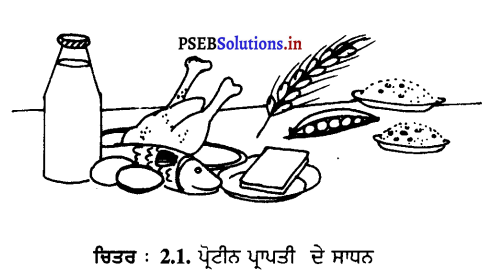
- ਇਹ ਸਰੀਰ ਵਿਚ ਨਵੀਆਂ ਕੋਸ਼ਿਕਾਵਾਂ ਅਤੇ ਤੰਤੂਆਂ ਨੂੰ ਬਣਾਉਂਦਾ ਹੈ ।
- ਇਸ ਨਾਲ ਸਰੀਰ ਵਿਚ ਪਾਚਕ ਤੱਤਾਂ ਦਾ ਨਿਰਮਾਣ ਹੁੰਦਾ ਹੈ ।
- ਇਹ ਮਾਨਸਿਕ ਸ਼ਕਤੀ ਵਧਾਉਣ ਵਿਚ ਸਹਾਇਕ ਹੈ ।
- ਇਹ ਸਰੀਰ ਵਿਚ ਖੂਨ ਦੇ ਕਣਾਂ ਵਿਚ ਵਾਧਾ ਕਰਦਾ ਹੈ । ਖੂਨ ਵਿਚ ਮੌਜੂਦ ਫਾਈਬਿਨ ਪ੍ਰੋਟੀਨ ਖੂਨ ਵਗਣ ਤੋਂ ਰੋਕਣ ਲਈ ਖੂਨ ਨੂੰ ਜਮਾਉਣ ਦਾ ਕੰਮ ਕਰਦਾ ਹੈ ।
- ਇਸ ਨਾਲ ਸਰੀਰ ਵਿਚ ਰੋਗਾਂ ਨਾਲ ਲੜਨ ਦੀ ਸ਼ਕਤੀ ਵਿਚ ਵਾਧਾ ਹੁੰਦਾ ਹੈ ।
- ਪ੍ਰੋਟੀਨ ਸਰੀਰ ਦੇ ਵੱਖ-ਵੱਖ ਕੰਮਾਂ ਨੂੰ ਕੰਟਰੋਲ ਕਰਨ ਵਿਚ ਸਹਾਇਤਾ ਕਰਦੇ ਹਨ ।
ਪੋਟੀਨ ਪ੍ਰਾਪਤੀ ਦੇ ਸੋਮੇ – ਪੋਟੀਨ ਜੰਤੂਆਂ ਅਤੇ ਪੌਦਿਆਂ ਦੋਹਾਂ ਤੋਂ ਪ੍ਰਾਪਤ ਹੁੰਦੇ ਹਨ ।
(ਉ) ਬਨਸਪਤੀ ਪ੍ਰੋਟੀਨ-
- ਅਨਾਜ-ਕਣਕ, ਜਵਾਰ, ਬਾਜਰਾ, ਚੌਲ, ਮੱਕੀ, ਰੌਂਗੀ, ਜਵੀ ।
- ਦਾਲਾਂ-ਅਰਹਰ, ਮਾਂਹ, ਮੂੰਗੀ, ਮਸਰ, ਸੋਇਆਬੀਨ, ਛੋਲਿਆਂ ਦੀ ਦਾਲ, ਚਪਟੀ ਸੇਮ ਦੇ ਸੁੱਕੇ ਬੀਜ, ਸੁੱਕੇ ਮਟਰ ਆਦਿ ।
- ਮੇਵੇ-ਕਾਜੂ, ਬਦਾਮ, ਅਖਰੋਟ, ਪਿਸਤਾ, ਮੂੰਗਫਲੀ ਆਦਿ ।
(ਅ) ਜੰਤੂ ਪ੍ਰੋਟੀਨ-
- ਆਂਡੇ, ਮਾਸ, ਮੱਛੀ, ਕਲੇਜੀ (ਲੀਵਰ ਆਦਿ ।
- ਦੁੱਧ ਅਤੇ ਦੁੱਧ ਤੋਂ ਬਣੇ ਪਦਾਰਥ-ਗਾਂ, ਮੱਝ, ਬੱਕਰੀ ਅਤੇ ਮਾਂ ਦਾ ਦੁੱਧ, ਸੁੱਕਾ ਦੁੱਧ, ਦਹੀਂ, ਪਨੀਰ ਆਦਿ ।
ਇੱਕ ਸ਼ਬਦ ਵਿੱਚ ਉੱਤਰ ਦਿਉ
ਪ੍ਰਸ਼ਨ 1.
ਪੁੰਗਰੀ ਦਾਲ ਵਿਚ ਕਿਹੜਾ ਵਿਟਾਮਿਨ ਵੱਧ ਜਾਂਦਾ ਹੈ ?
ਉੱਤਰ-
ਵਿਟਾਮਿਨ ਸੀ ।
ਪ੍ਰਸ਼ਨ 2.
ਆਇਓਡੀਨ ਦਾ ਸੰਬੰਧ ਕਿਸ ਗ੍ਰੰਥੀ ਨਾਲ ਹੈ ?
ਉੱਤਰ-
ਥਾਈਰਾਈਡ ।
ਪ੍ਰਸ਼ਨ 3.
ਚਿਕਨਾਈ ਦੋ ਪ੍ਰਕਾਰ ਦੀ ਪ੍ਰਾਣੀਜਨ ਅਤੇ …………………….. ਚਿਕਨਾਈ ਹੁੰਦੀ ਹੈ ?
ਉੱਤਰ-
ਬਨਸਪਤੀ ।
ਪ੍ਰਸ਼ਨ 4.
ਵਿਟਾਮਿਨ ਸੀ ਦੀ ਕਮੀ ਨਾਲ ………………………… ਰੋਗ ਹੋ ਜਾਂਦਾ ਹੈ ? ਉੱਤਰ-ਸਕਰਵੀ ।
ਪਸ਼ਨ 5.
ਦੰਦਾਂ ਅਤੇ ਹੱਡੀਆਂ ਵਿਚ ਕਿਹੜਾ ਖਣਿਜ ਵਰਤਿਆ ਜਾਂਦਾ ਹੈ ?
ਉੱਤਰ-
ਕੈਲਸ਼ੀਅਮ ।
ਪ੍ਰਸ਼ਨ 6.
ਚਿਕਨਾਈ ਦੀ ਕਮੀ ਨਾਲ ਕੀ ਹੁੰਦਾ ਹੈ ? (ਇਕ ਦੱਸੋ।
ਉੱਤਰ-
ਥਕਾਵਟ ਤੇ ਬੇਚੈਨੀ ਜਲਦੀ ਹੋ ਜਾਂਦੀ ਹੈ ।

ਪ੍ਰਸ਼ਨ 7.
ਪੂਰਨ ਪ੍ਰੋਟੀਨ ਦੀ ਉਦਾਹਰਨ ਦਿਉ ।
ਉੱਤਰ-
ਅੰਡਾ, ਮਾਸ ।
ਪ੍ਰਸ਼ਨ 8.
ਬੇਰੀ-ਬੇਰੀ ਰੋਗ ਕਿਹੜੇ ਵਿਟਾਮਿਨ ਦੀ ਕਮੀ ਨਾਲ ਹੁੰਦਾ ਹੈ ?
ਉੱਤਰ-
ਵਿਟਾਮਿਨ ‘ਬੀ’ ।
![]()
